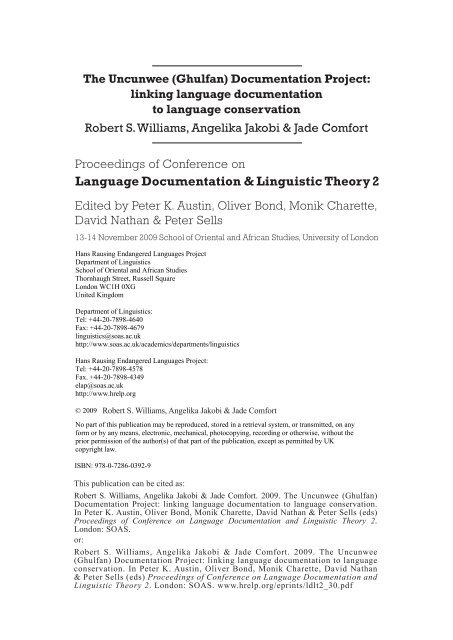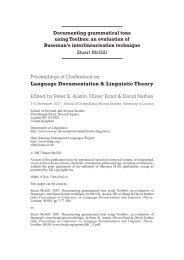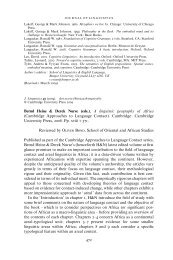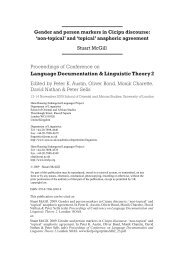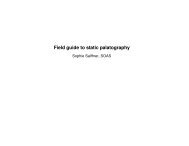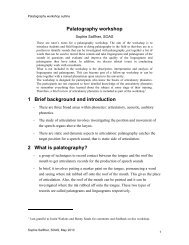Language Documentation & Linguistic Theory 2 - Hans Rausing ...
Language Documentation & Linguistic Theory 2 - Hans Rausing ...
Language Documentation & Linguistic Theory 2 - Hans Rausing ...
Create successful ePaper yourself
Turn your PDF publications into a flip-book with our unique Google optimized e-Paper software.
LANGUAGE DOCUMENTATION AND LINGUISTIC THEORY 2Our goals at this point were twofold. First, we wanted to describe the language,and in doing so produce an Uncunwee grammar and Uncunwee-English-Arabicdictionary, as well as gain insight into the relationship between Uncunwee, theother Kordofan Nubian dialects, and other Nubian languages. We also wanted togather data in various formats that we could analyze and archive, as per ouragreement with ELDP, our main funding source. While it was our intention tocontinue to focus on documentary and descriptive work, we realized early in ourstay in Sudan that the primary linguistic goal of a group of influential Uncucommunity leaders and intellectuals was to maintain Uncunwee as a viablelanguage.2. THE STATE OF UNCUNWEE AND LANGUAGE CONSERVATION INTHE UNCUNWEE COMMUNITYIt became apparent to us at the beginning of our stay in Sudan that the Uncucommunity was already well aware of the erosion of both their language andculture, and had already begun earnest discussion on this matter. Especially in theNuba Mountains Uncu area, if not in the Uncu communities in Khartoum, theelder generation has acquired Uncunwee as a first language but their children tendto grow up with Arabic as a first language. Uncunwee is used in family andcommunity domains in the Nuba Mountains, but not as a language of instructionin the schools or as a lingua franca outside of the Kordofan Nubian group. Arabic,as the result of a long-standing policy of Arabization by the Khartoumgovernment, dominates in these areas. Since Uncunwee is a non-written language,there has also been no formal teaching of the language or the culture in theschools.Perhaps the most serious threat to the existence of Uncunwee lies in the area offirst language acquisition. Even in the remotest villages, there is now a growingtrend among young mothers, themselves schooled in Arabic, to raise their childrenas monolingual Arabic speakers. This behavior seems to be based on a sharedingrained and perhaps subconscious belief among younger adults that Uncunweeis a tribal language that is inferior to Arabic, thus marking its users with a socialstigma. This mirrors other language obsolescence situations. For example, thissame pattern was found among speakers of American Indian languages inOklahoma during the early part of the 20 th century, resulting with one exception,in near-language-death states for the Oklahoma tribes. It is also possible that Uncuparents believe that bilingual first language acquisition will result in incompleteacquisition of one or both languages, though this has yet to be determined.Though our interviews with various Uncu people revealed an awareness of theseriousness of this trend, this problem had not yet been recognized in communitydiscussions of language conservation issues.However, some efforts aimed at language maintenance, such as attempts todevelop an Uncunwee orthography and create an Uncunwee-Arabic word list,were already being undertaken by individuals, and efforts to organize language296
ROBERT S. WILLIAMS, ANGELIKA JAKOBI & JADE COMFORTconservation endeavors were underway among Uncu leaders and intellectuals.This ad hoc language and culture conservation group recognized the importanceof the ongoing orthography and lexicography work. They also understood both tobe precursors to establishing Uncunwee as a written language, which was in turnseen as a condition necessary to halt the language obsolescence process. It wasbelieved that an orthography and word list would facilitate the development ofUncunwee texts that could be used to teach the Uncu language and culture inschools.At present, there is no place for the teaching of the Uncu language and culturein the Sudanese national curriculum. However, the budding Uncu languageconservation efforts come at a propitious time, coinciding as they do with the2005 Comprehensive Peace Agreement between the state of South Kordofan, theten states comprising South Sudan, and the Khartoum government. Thisagreement gives the southern signatories a modicum of autonomy in language andeducation policy, allowing them to designate the language of instruction and, tosome extent, the curriculum that is used in their schools. So if and whenUncunwee texts are developed, it is quite possible that the language and culturemight be taught in schools with a large majority of Uncu students.The fact that the Uncu community was already aware that their language andculture were undergoing a process of obsolescence and had begun efforts toaddress this situation when we arrived in Sudan in January 2009, was veryfortunate for us and, we hope, the Uncu people. This meant that ourdocumentation and description agendas were seen by Uncu elders andintellectuals as being helpful to, and compatible with, their language and cultureconservation goals. For us, this meant a relatively easy and immediate access toUncunwee speakers who were willing to cooperate with us in our work. For theUncu community, it meant that they would have access to various types oflinguistic and technical expertise not present among community members. Thuswe agreed to broaden our mandate to include assisting in the Uncunweeconservation effort.3. LINKING DOCUMENTATION AND CONSERVATIONIt is our position that any successful language conservation effort must be led andcarried out by the speakers themselves, and not by outsiders, such as linguists oranthropologists. This is not to say, however, that documentary linguists shouldplay no part in language conservation, and in fact, UDP team members feel anobligation to assist community member in maintaining and conserving Uncunwee.We can do this in a variety of ways, including providing assistance in the learningof relevant linguistic and computer skills by community language conservers;helping community members identify and focus on important aspects of languageconservation; assisting in developing writing systems, where needed, as well aswritten language learning materials such as readers and other texts; helping todevelop language awareness campaigns targeted at community members; and297
LANGUAGE DOCUMENTATION AND LINGUISTIC THEORY 2helping to connect community language conservers with other languageconservation groups meeting similar challenges.To this end, our initial response to the community’s request involved offeringto train community members in some elementary language documentation skills,such as use of the IPA and the writing of the Uncunwee tones. We also begandiscussion with the Uncu group interested in language conservation about otherimportant issues involved in language maintenance, including the aforementionedlanguage transmission situation.3.1. Bringing descriptive linguistic skills to the Uncu communityWe initially began working together with the two Nuba Mountain-basedUncunwee speakers who were already engaged in developing the aforementionedorthography and Uncunwee-Arabic word list. These two young men, who areacknowledged by elder group members as excellent Uncunwee speakers, alsobecame our translators and guides on visits to Uncu villages. They graciously putin long hours everyday, coming to our compound in the evenings after field workdays to help us translate data and to begin learning IPA transcription and how toidentify and write the tones of Uncunwee. This was of immediate value to theorthography development work, since prior to our arrival, lack of linguisticknowledge made it impossible for Uncu language conservers to identifyphonemes and allophonic relationships in the Uncunwee phonetic inventory. Oneof our first successes in working with our new Uncu colleagues was to accomplishthis task, so that we are now in a position to assign characters to Uncunweephonemes, a necessary first step in the making of a writing system. In fact, thiswas not our first field school. We have been training our Uncu project member inCairo in the basics of descriptive linguistics for the last two years. This helped inour initial training efforts in the Nuba Mountains and our experience there helpedto refine our training in Cairo.Our work with these two young men, who have now become UDP team members,combined with previous work with our Cairo team, also greatly advanced ourknowledge of the Uncunwee tone system, important for our grammatical andlexicography work as well as for the development of an Uncunwee alphabet.Because of this collaboration, the Uncu community is now in a position to beginthe long and difficult linguistic and political work that is involved in theestablishment of a writing system. We hope to expand our field school on our nextvisit, teaching more language documentation skills and offering this training tomore community members. In addition, we are planning to bring a lexicographyexpert to the University of Khartoum in January 2010, to offer an elementarydictionary making workshop to Uncunwee language conservers as well asacademic and community linguists working to document other languages.3.2. Community expertise put to useWe have thus far discussed a traditional symbiotic relationship between thelanguage community and documentary linguists, with the community providingdata and the linguists providing technical expertise. However, the Uncu298
ROBERT S. WILLIAMS, ANGELIKA JAKOBI & JADE COMFORTcommunity has also been providing us with skills and tutelage in culturalrelevance that has benefited us in the making of more effective elicitation devices.For example, community members and local linguists have assisted us by drawingculturally relevant elicitation prompts and by making video recordings ofelicitation prompt directions in the national language. We now have pictureprompts and video-taped directions for the elicitation of locative marking and planto expand this effort on our next visit. We have also been able to put these promptdirections, as well as video clip prompts from the Nijmegen ‘put’ project, ontoiPods, which allows easy use of these elicitation devices in the field. Involvingspeech community members in activities such as these will eventually enabletrained Uncunwee speakers to carry out linguistic elicitation on their own, orunder long distance supervision through the use of programs such as Skype,which we have been using for elicitation checks since our return from the field.3.3. Advising community language conserversDuring our stay in the Uncu area, we had two meetings with Uncu and otherAjang leaders to discuss language and culture conservation issues. In one of themeetings, the topic was the possibility of developing an orthography that could beused by all Kordofan Nubian dialects. Some of the participants brought to thismeeting a clear political agenda, seeking linguistic support for a cultural andpolitical unification effort among Ajang groups. This underscored for us theintensely political aspect of language conservation in general and morespecifically the adoption of writing systems, and gave us the opportunity to makeclear the desired political neutrality of our work and to establish that we wouldprovide necessary linguistic data for conservation but would not engage in theinternal politics of language maintenance efforts.The second meeting, held with members of the UDP and Uncu intellectualsand community leaders, focused on the various necessary conditions forsuccessful Uncunwee language conservation. The Uncu group placed primaryemphasis on orthography development and the production of written Unculanguage and culture materials, and we agreed that this was a vital area forconservation. In the discussion on this point, we were asked when the texts wouldbe ready. This gave us the opportunity to talk about the importance of the primacyof community leadership and involvement in language conservation. We made apoint that while we would do initial work with the community in orthographydevelopment, and would eventually produce an Uncunwee grammar and adictionary, the development of Uncunwee texts must come from the community,albeit with our help.Finally, we talked about what is perhaps the most urgent issue in the Uncunweeobsolescence process, the cessation of Uncunwee first language transfer. Thepoint was made that if mothers stopped raising their children as speakers ofUncunwee, no amount of textbook development could stop the obsolescenceprocess. To this end, we suggested developing a public awareness advertisingcampaign aimed at combating locally held negative beliefs about raising childrenas bilingual Uncunwee-Arabic speakers and concomitant negative attitudes about299
LANGUAGE DOCUMENTATION AND LINGUISTIC THEORY 2the status of Uncunwee versus that of Arabic and English. Such a campaign wouldtarget girls in primary and secondary school in an effort to reverse the now widespreadpractice of raising children as monolingual speakers of Arabic.4. OBLIGATION, ASSISTANCE & POLITICSThe members of the UDP recognize a great debt to the Uncu people, for withoutthem we would not have a documentation project, nor would we be able to carryout descriptive linguistic scholarship. From the beginning of our work withUncunwee speakers in Cairo, and later in Khartoum and in the Nuba Mountains,the Uncu have generously and cheerfully shared their language and culture withus. Their pride in their language, the great value they place on it and their deepattachment to it are evident to all who encounter Uncu people.While as linguists our primary professional obligation is to descriptive anddocumentary linguistics, we recognize and gladly embrace an ethical obligation togive back to the Uncu by assisting them in their efforts to maintain the vitality ofUncu language and culture and its centrality to Uncu life. In order for this to besuccessful, it is important to understand the nature and complexities of thelinguist’s participation in the conservation process, which has been the primaryfocus of this paper. A few principles have already become clear to us. First,linguists who carry out descriptive and/or documentary work with a languagecommunity have an obligation to assist that community, if asked, in languageconservation. Second, while we as linguists can provide expertise and training thatis essential to the conservation process, the language conservation process itselfmust be driven, led, and carried out by the speech community. Finally, to themaximum possible extent, the participation of linguists in language conservationshould be politically neutral, especially with respect to any intra-group division,such as clans or political parties.It is clear to us that, while we have begun cooperative language conservationwork with the Uncu, we will need to continually assess and make adjustments tothe UDP/Uncu partnership in order to ensure the maximum effectiveness of thedocumentation and conservation projects.REFERENCESStevenson, R. C. (1984). The Nuba people of South Kordofan. Graduate CollegePublications. Monograph 7. Khartoum, Sudan: University of Khartoum.300


